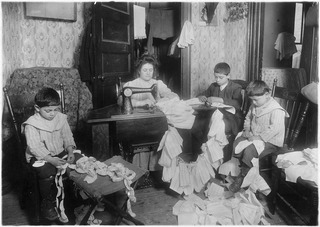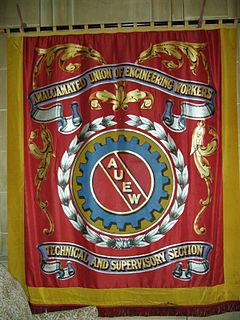The General Union of Tinplate Workers was a trade union representing sheet metal workers in the United Kingdom.
A trade union, also called a labour union or labor union (US), is an association of workers in a particular trade, industry, or company created for the purpose of securing improvement in pay, benefits, working conditions or social and political status through collective bargaining and working conditions through the increased bargaining power wielded by creation of a monopoly of the workers. The trade union, through its leadership, bargains with the employer on behalf of union members and negotiates labour contracts with employers. The most common purpose of these associations or unions is "maintaining or improving the conditions of their employment". This may include the negotiation of wages, work rules, complaint procedures, rules governing hiring, firing and promotion of workers, benefits, workplace safety and policies.

The United Kingdom (UK), officially the United Kingdom of Great Britain and Northern Ireland, informally as Britain, is a sovereign country lying off the north-western coast of the European mainland. The United Kingdom includes the island of Great Britain, the north-eastern part of the island of Ireland and many smaller islands. Northern Ireland is the only part of the United Kingdom that shares a land border with another sovereign state, the Republic of Ireland. Apart from this land border, the United Kingdom is surrounded by the Atlantic Ocean, with the North Sea to the east, the English Channel to the south and the Celtic Sea to the south-west, giving it the 12th-longest coastline in the world. The Irish Sea lies between Great Britain and Ireland. With an area of 242,500 square kilometres (93,600 sq mi), the United Kingdom is the 78th-largest sovereign state in the world. It is also the 22nd-most populous country, with an estimated 66.0 million inhabitants in 2017.
The union was founded in 1862 in Manchester, bringing together nine local societies of tin plate workers from across Lancashire. Initially, its main aim was to help skilled tin plate workers find employment. However, it grew rapidly, and from 1871, it began offering welfare services, including pensions, and payments to unemployed members, and to the families of members who died. It accepted only members who had completed an apprenticeship in the trade, and charged older members higher joining fees. [1]

Manchester is a city and metropolitan borough in Greater Manchester, England, with a population of 545,500 as of 2017. It lies within the United Kingdom's second-most populous built-up area, with a population of 3.2 million. It is fringed by the Cheshire Plain to the south, the Pennines to the north and east, and an arc of towns with which it forms a continuous conurbation. The local authority is Manchester City Council.

Lancashire is a ceremonial county in North West England. The administrative centre is Preston. The county has a population of 1,449,300 and an area of 1,189 square miles (3,080 km2). People from Lancashire are known as Lancastrians.

An apprenticeship is a system of training a new generation of practitioners of a trade or profession with on-the-job training and often some accompanying study. Apprenticeship also enables practitioners to gain a license to practice in a regulated profession. Most of their training is done while working for an employer who helps the apprentices learn their trade or profession, in exchange for their continued labor for an agreed period after they have achieved measurable competencies. Apprenticeships typically last 3 to 7 years. People who successfully complete an apprenticeship reach the "journeyman" or professional certification level of competence.
By 1876, the union was based in Liverpool, and most of its membership were connected with shipbuilding. It opposed piece work, largely because the jobs done by its members were too varied to construct a single agreed price list. [2]

Liverpool is a city in North West England, with an estimated population of 491,500 within the Liverpool City Council local authority in 2017. Its metropolitan area is the fifth-largest in the UK, with a population of 2.24 million in 2011. The local authority is Liverpool City Council, the most populous local government district in the metropolitan county of Merseyside and the largest in the Liverpool City Region.

Piece work is any type of employment in which a worker is paid a fixed piece rate for each unit produced or action performed regardless of time.
In 1892, the union changed its name to the General Union of Braziers and Sheet Metal Workers and, the following year, was successful enough to make its post of secretary a full-time one. It joined the Federation of Engineering and Shipbuilding Trades in 1897, and the National Amalgamated Sheet Metal Workers' and Braziers' Society in 1900. It merged with National Amalgamated Association of Tin Plate Workers of Great Britain and a large number of local unions in 1920 to form the National Union of Sheet Metal Workers and Braziers. [1]
The National Amalgamated Association of Tin Plate Workers of Great Britain was a trade union representing sheet metal workers in the United Kingdom.




